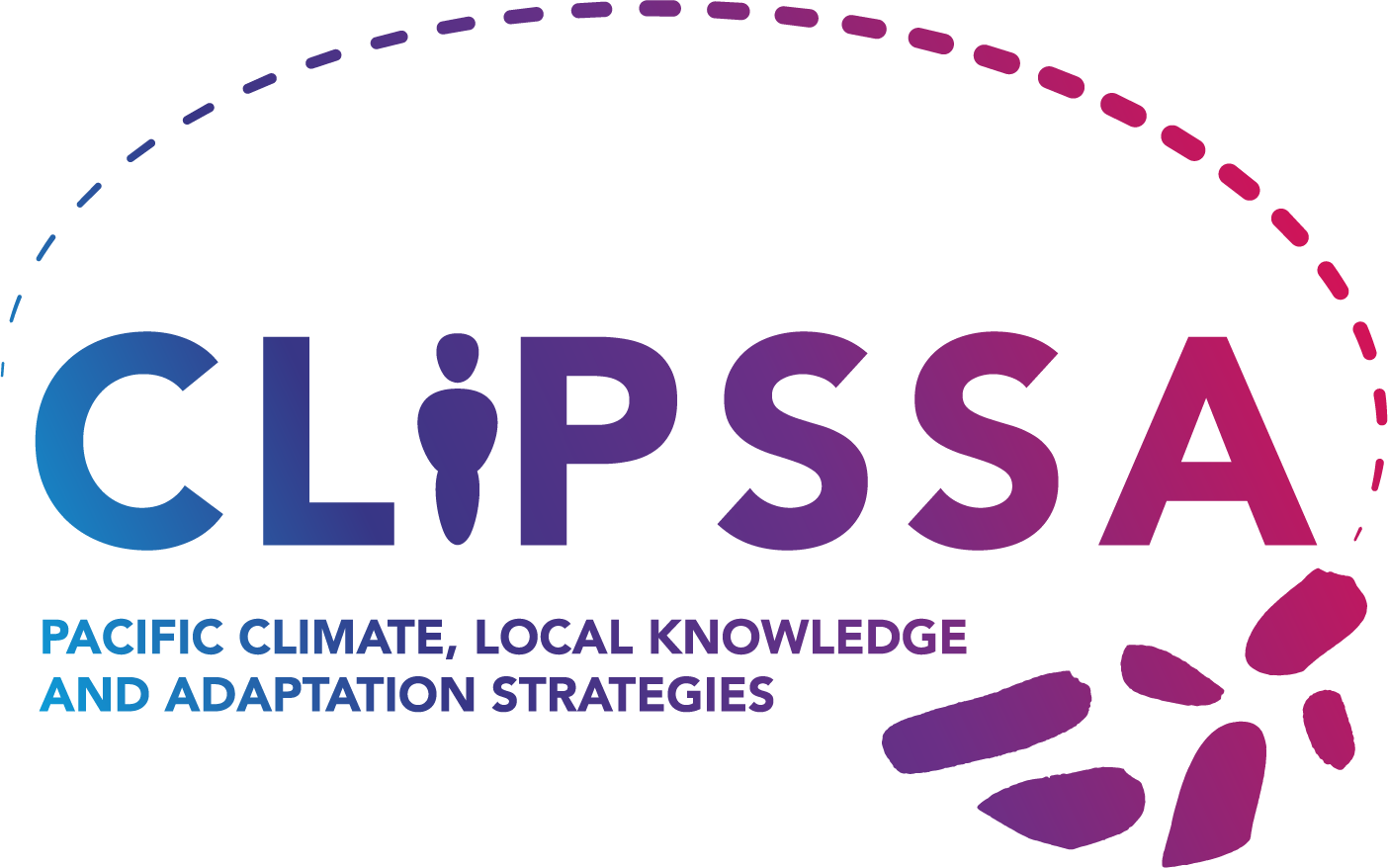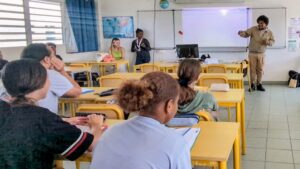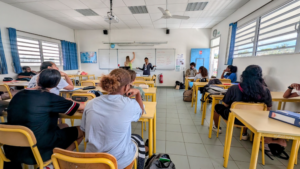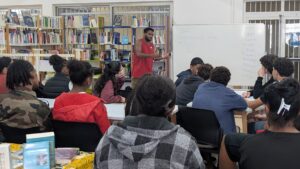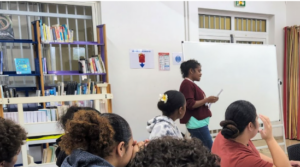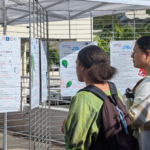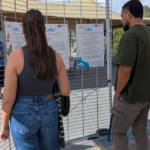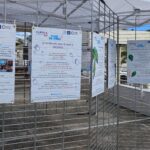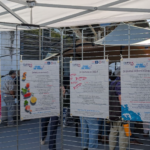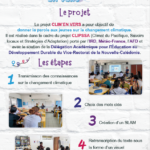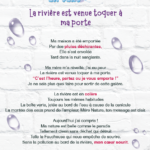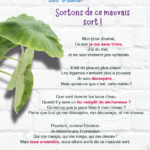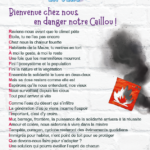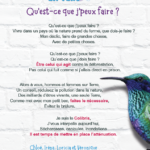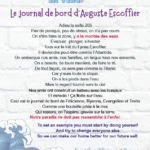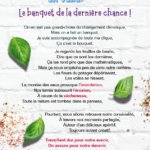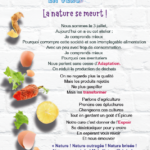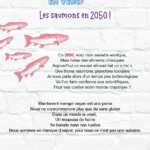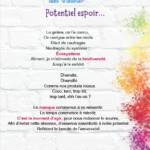Supported by IRD, Météo-France and AFD, the CLIPSSA project (Pacific Climate, Local Knowledge and Adaptation Strategies) aims to give a voice to the younger generation on climate change, blending science with the art of writing. The Clim’en Vers initiative stems from this ambition. It was conceived by Caroline AGIER, communications and digital affairs officer at the interregional office of Météo-France in New Caledonia and Wallis and Futuna. The goal is to guide students in creating texts related to climate change and adaptation, and to showcase their work at relevant events in the form of display panels.
Passing on knowledge about climate change
To launch the project, Thomas ABINUN, meteorology and climate studies engineer at the Météo-France interregional office in New Caledonia and Wallis and Futuna, and Myriam VENDÉ-LECLERC, climate adaptation strategy officer for the Government of New Caledonia, introduced students to the key concepts of global climate change and the different ways to adapt to it. On Tuesday, May 6, 2025, two classes from Lycée Escoffier in Nouméa attended this presentation, coordinated by their science teacher, Ms. BERTRAND.
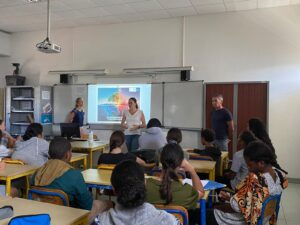
Introductory session on climate change at Lycée Escoffier, 05/06/2025, ©Cléophée MONTIZON
Choosing key words, writing and performance
In the second stage—writing—the 10th-grade class in Hospitality and Catering Sciences and Technologies (STHR) dedicated two hours of their French class on Thursday, May 22, to the activity led by Mr. MAFFAY. This writing workshop was facilitated by Georgina SIOREMU, artist and communications and science mediation assistant within the CLIPSSA team. It allowed students to create heartfelt, committed texts while sharpening their sense of rhythm through a final recitation. Their original work emerged from four different writing prompts:
- Write a letter to someone close to you who lives on the other side of the world and doesn’t yet fully understand the impact of climate change. Warn them.
- You live by a river. Due to heavy rains, your house was flooded and you had to move up into the mountains. Describe how you feel.
- Do you know the story of the hummingbird metaphor? If it could speak, what would it say to humankind?
- You run into a former internship supervisor years later. He runs a restaurant and tells you how hard it has become to source key ingredients—especially yam, sweet potato and taro—because of droughts and floods. You go home and write your thoughts in a journal.
Writing session at Lycée Escoffier, May-July 2025, ©Caroline AGIER
In the following workshops, held on Wednesday, July 2 and Wednesday, July 9, students added stylistic devices and refined their sentences to make them more impactful. Each group then practiced performing their text aloud.
On Thursday, July 3, 11th-grade students were surprised by the arrival of a new guest: Simane, a slam artist with both local and international recognition, joined by influencer and TV presenter Astro, and Passil, organizer of the Urban Films Festival. They introduced them to the fundamentals of slam poetry—its definition, values, and purpose. Using a list of verbs and a word cloud on the theme of “the environment”, he created a slam in just a few minutes. Simane then offered a wealth of advice on how to deliver and pace their texts. The students watched several slam performances by the guests.
Writing session at Lycée Escoffier, 07/03/2025, ©Caroline AGIER
The second hour was devoted to a writing workshop led by Georgina, designed to link the students’ future profession in hospitality to the CLIPSSA project. A series of prompts helped guide their writing:
- Tomorrow’s menu – cooking in times of crisis: Imagine a restaurant in 2050 facing food shortages due to climate change. How do they adapt? What new recipes? What creativity?
- The submerged school – tale of a sunken place: Tell the story of a hospitality school located on a coastline threatened by rising sea levels. What happens to its staff, its clients, its legacy?
- The last chance banquet: You are organizing a symbolic meal to raise awareness about climate change. What’s on the menu? Who do you invite? What is the atmosphere like?
- Journal of an eco-responsible apprentice: You follow an apprentice learning to cook and serve while reducing environmental impact—sorting waste, sourcing locally, saving energy, following ethical practices…
- A world without seasons: Imagine a world where seasons no longer exist. How does this affect restaurant operations and menu planning?
The young slammers thus went through all the key phases of text creation: developing ideas, searching for vocabulary, writing with rhyme, and incorporating stylistic devices. On Friday, July 4, the 11th-grade students finalized their texts, produced clean copies, and performed their final versions aloud.
The creative works of both 11th- and 12th-grade students were exhibited during the Caledonian Forum on Climate Change held on July 22, organized by the Government of New Caledonia in partnership with the University of New Caledonia (UNC).
Exhibition at the Caledonian Forum on Climate Change, 07/22/2025, ©Caroline AGIER
They will be showcased again on August 8 during the Science and ESD Festival organized by the Vice-Rectorate, and in October during the Science Festival coordinated by CRESICA.
Clim’en Vers exhibition panels, 07/2025, ©Caroline AGIER
